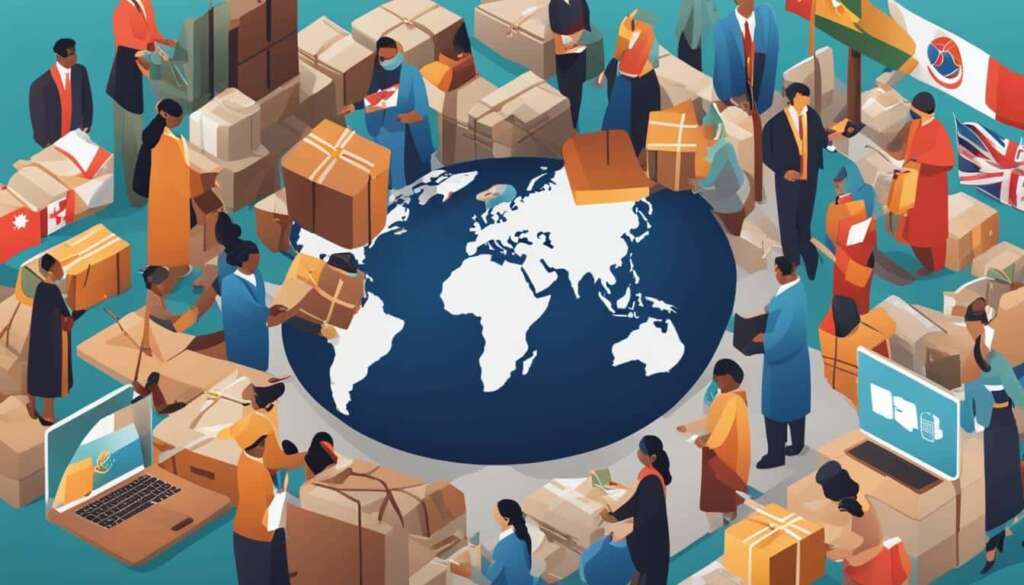Table of Contents
B2B, or business-to-business, is a form of electronic commerce where businesses exchange products, services, or information with other businesses, rather than with consumers (B2C). This type of commerce operates through various categories of websites, including company websites, product supply and procurement exchanges, specialized industry portals, brokering sites, and information sites.
Global B2B e-commerce is a rapidly growing sector, projected to reach $20.9 trillion by 2027 with a compound annual growth rate (CAGR) of 17.5%. This phenomenal growth highlights the significance and potential of B2B business models.
In the B2B landscape, there are companies known as B2B enterprises, which provide software solutions for building B2B websites. These enterprises offer essential tools, templates, databases, and transaction software to facilitate seamless business transactions and digital interactions between businesses.
In this section, we will delve deeper into how B2B works, why it is important, the benefits it offers, the challenges faced, and examples of successful B2B companies. By the end of this guide, you will have a comprehensive understanding of B2B and its impact on the business world.
How Does B2B Work?
In the B2B (business-to-business) model, one business sells products or services to another business. This type of transaction is different from B2C (business-to-consumer) where businesses sell directly to individual consumers. B2B transactions involve larger product purchases and often require a more complex decision-making process.
A key aspect of B2B transactions is the presence of a buying committee. This committee consists of individuals within the buying business who play different roles in the decision-making process. It typically includes a business decision-maker, who has the authority to approve the purchase, a technical decision-maker who evaluates the technical aspects of the product or service, and influencers who provide insights and recommendations to the decision-makers.
In some cases, larger product purchases in B2B require a formal request for proposal (RFP) process. The buying business creates an RFP document outlining their specific requirements and invites prospective vendors to submit proposals. This allows the buying business to evaluate different vendors based on their proposals and choose the one that best aligns with their needs.
The goal of a B2B transaction can vary based on the buying business’s objectives. It could be to support the buying business’s operations by procuring necessary goods or services. Alternatively, it could be for the entire company’s use, such as implementing a new software system or investing in equipment for their production process.
In summary, B2B transactions involve businesses selling products or services to other businesses. The buying process may involve a buying committee and could include a request for proposal. The ultimate goal of a B2B transaction is to support the buying business’s operations or achieve their broader business goals through larger product purchases.
Why is B2B important?
B2B (business-to-business) plays a critical role in the success of businesses as they require the purchase of products and services from other businesses to launch, operate, and grow. This interdependence between businesses creates a vibrant ecosystem where various B2B suppliers cater to the needs of different industries and sectors.
Businesses rely on B2B suppliers to provide essential goods and services that are vital for their operations. Some examples of products and services offered by B2B suppliers include:
- Office space
- Office furniture
- Computer hardware
- Signage and branding
These suppliers play a crucial role in ensuring that businesses have the necessary resources to carry out their day-to-day activities effectively and efficiently.
Furthermore, the B2B landscape encompasses a diverse range of companies that cater to different needs within the business ecosystem. These types of B2B companies include:
1. Producers
Producers are businesses involved in manufacturing or creating products that are sold to other businesses. They may specialize in specific industries or offer a wide range of products.
2. Retailers
Retailers are B2B companies that purchase products from producers or wholesalers and sell them to businesses. They act as intermediaries between producers and the end users.
3. Resellers
Resellers are businesses that acquire products from producers or retailers and sell them to businesses. They play a crucial role in distribution and supply chains.
4. Agencies and Consultants
Agencies and consultants provide specialized services and expertise to businesses, offering advice, strategy, and subcontracted work to support various aspects of business operations and growth.
These different types of B2B companies create a vibrant ecosystem where businesses can find the specific products, services, and expertise they need to thrive.
The image above visually represents the importance of B2B in enabling businesses to access essential products and services from B2B suppliers, supporting their growth and success.
Benefits of B2B
B2B, or business-to-business, offers numerous advantages that make it a preferred model for many companies. From larger average deal sizes to faster delivery, B2B provides opportunities for growth and efficiency in today’s competitive marketplace.
Large Average Deal Size
One of the key advantages of B2B transactions is the potential for large average deal sizes compared to B2C. When businesses buy from other businesses, the volume of goods or services involved is typically higher, resulting in more significant transactions. This can lead to increased revenue and profitability for both parties involved.
Higher Switching Costs
B2B relationships often require substantial investments of time, resources, and expertise. The higher switching costs associated with transitioning between B2B suppliers or partners encourage customer loyalty. Businesses are more likely to stick with their existing B2B providers, fostering long-term partnerships and repeat business.
Large Market Potential
The B2B market has immense potential across various industries and geographies. Businesses are constantly seeking products and services to support their operations and growth. By tapping into this vast market, B2B companies can expand their customer base and capitalize on new opportunities.
Advertising Products and Services
B2B companies have the advantage of advertising their products and services to a targeted audience of businesses. Through strategic marketing efforts, businesses can showcase their offerings, highlighting the value and benefits they provide. This enables them to attract potential customers and establish themselves as industry leaders.
Business Online
In today’s digital age, conducting business online is essential for efficiency and reach. B2B companies can leverage e-commerce platforms to streamline transactions, expand their customer reach, and operate 24/7. With an online presence, businesses can establish credibility and convenience for buyers.
Faster Delivery
Efficient digital transaction models in B2B enable faster delivery of products and services. By leveraging technology and automated processes, businesses can expedite order fulfillment, reducing lead times and enhancing customer satisfaction. This improves the overall efficiency of the supply chain.
Built-in Order Management
Effective order management is crucial for seamless B2B transactions. Built-in order management systems enable businesses to synchronize data across channels, track orders, manage inventory, and streamline logistics. This ensures smooth operations and enhances customer experience.
Overall, B2B offers various benefits, including larger average deal sizes, higher switching costs, vast market potential, effective advertising opportunities, online business capabilities, faster delivery, and built-in order management systems. These advantages make B2B a compelling choice for businesses looking to thrive in today’s competitive landscape.
| Benefits of B2B |
|---|
| Larger average deal sizes |
| Higher switching costs |
| Large market potential |
| Advertising products and services |
| Business online |
| Faster delivery |
| Built-in order management |

B2B Challenges
In the world of B2B e-commerce, there are unique challenges that businesses encounter. Understanding and addressing these challenges is crucial for success in this dynamic market.
1. Long-Term Customer Retention
Establishing long-term customer relationships poses a challenge in B2B. Unlike B2C transactions, where consumers make frequent purchases, B2B customers may be more hesitant to make repeat purchases. Building trust and demonstrating value over time is essential for retaining loyal and satisfied customers.
2. Limited Market and Increased Competition
Compared to the consumer market, the B2B market is often smaller and more limited. This limited market size intensifies competition among businesses operating in the B2B space. To thrive, B2B companies must continuously innovate, differentiate themselves, and find unique ways to stand out from their competitors.
3. Longer Decision-Making Process
The decision-making process in B2B transactions can be considerably longer compared to B2C. This is due to multiple stakeholders involved in the decision-making process, each with their own considerations and requirements. B2B companies need to navigate through these complexities and build effective relationships with decision-makers to facilitate smoother decision-making processes.
4. Price Negotiation
Price negotiation is a common practice in B2B transactions. Unlike B2C, where prices are usually fixed, B2B customers often require customized pricing structures based on volume, duration, or specific needs. B2B companies must have robust negotiation strategies in place to ensure fair and profitable deals while maintaining customer satisfaction.
5. E-commerce Supply Chain Management
The management of the e-commerce supply chain in the B2B context can be complex. Miscommunication and delays can occur when dealing with multiple suppliers, manufacturers, and distributors. Efficient supply chain management is crucial for ensuring smooth operations, timely delivery, and customer satisfaction.
To overcome these challenges, B2B businesses must remain agile, continuously adapt to market trends and evolving customer needs, and leverage technology and data-driven insights to make informed decisions. By addressing these challenges head-on, B2B companies can position themselves for long-term success in the competitive e-commerce landscape.
Examples of B2B companies
When it comes to B2B companies, there are numerous examples that demonstrate the wide range of industries and offerings within this market. Some prominent examples include:
- Amazon Web Services (AWS): As the B2B arm of Amazon, AWS provides cloud computing services, storage, and infrastructure solutions to businesses of all sizes, enabling them to scale and innovate.
- Caterpillar: Known for its heavy machinery and equipment, Caterpillar serves businesses in the construction, mining, and agriculture sectors, providing them with reliable and efficient industrial goods.
- Alibaba: As a global B2B marketplace, Alibaba connects buyers and sellers worldwide, offering a wide array of products and services across various industries.
- Quill: Quill specializes in B2B e-commerce for office supplies, offering businesses a convenient platform to purchase stationery, furniture, and other office essentials.
- Upwork: Upwork is a popular job search platform that connects freelancers with employers. It caters not only to businesses looking to hire skilled professionals but also to individual consumers in need of specific services.
What sets these B2B companies apart is their ability to cater to both businesses and consumers, positioning them as versatile players in the market. While primarily serving the B2B segment, some of these companies also directly engage with individual consumers, further expanding their reach.
These examples highlight the diverse nature of B2B companies and the significant role they play in bridging the gap between businesses and consumers alike.
FAQ
What is B2B?
B2B stands for business-to-business, which is a type of electronic commerce where products, services, or information are exchanged between businesses rather than between businesses and consumers (B2C).
How does B2B work?
In B2B, one business sells products or services to another business. The transaction can involve a buying committee, which includes a business decision-maker, technical decision-maker, and influencers. Larger product purchases may require a request for proposal, where prospective vendors submit proposals.
Why is B2B important?
B2B is important because businesses need to purchase products and services from other businesses to start, operate, and expand. B2B suppliers provide various goods and services, such as office space, office furniture, computer hardware, and signage. There are different types of B2B companies, including producers, retailers, resellers, and agencies/consultants that offer advice and subcontracted work to businesses.
What are the benefits of B2B?
B2B has several benefits, including larger average deal sizes compared to B2C, higher switching costs leading to customer loyalty, large market potential across industries and geographies, the ability to advertise products and conduct business online, faster delivery through efficient digital transaction models, and built-in order management systems for synchronizing data across channels.
What are the challenges of B2B?
B2B e-commerce faces challenges such as long-term customer retention, as businesses may be hesitant to make repeat purchases. The B2B market is also more limited in size compared to the consumer market, making it more competitive. Decision-making in the B2B sector can be slower due to involvement from multiple stakeholders. Price negotiation is common in B2B transactions, and managing the e-commerce supply chain can be complex with miscommunication potentially causing delays.
Can you provide examples of B2B companies?
Some examples of B2B companies include Amazon Web Services (B2B arm of Amazon), Caterpillar (selling industrial goods), Alibaba (B2B marketplace connecting buyers and sellers worldwide), Quill (B2B e-commerce for office supplies), and Upwork (job search platform connecting freelancers with employers). Some of these B2B companies also sell directly to consumers in addition to catering to other businesses.













